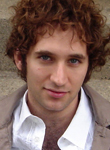Microsoft-supported research could secure online voting
By Bill Steele

Rafael Pass, assistant professor of computer science, has been selected as one of five 2009 Microsoft Research New Faculty Fellows. His fellowship will support research into new ways to conduct transactions safely and reliably in such situations as auctions and anonymous online voting.
The five faculty fellowship winners each receive an unrestricted cash gift of $200,000, as well as additional Microsoft resources, including software, invitations to academic and professional conferences, and the opportunity to engage firsthand with leading researchers from Microsoft Research.
Many transactions depend on a trusted third party. In an auction, for example, a third party is trusted to ensure that no bidder obtains an unfair advantage by learning the amounts of other bids, and that the high bidder is correctly selected so the seller receives the highest possible return.
Computers offer the possibility of eliminating the third party, reducing costs (eBay takes a percentage) and avoiding the question of whether the third party is truly trustworthy. Information can be sent from one party to another in encrypted form in such a way that the recipient can compute an answer to a limited question like "Which bid was highest?" or "Which candidate got the most votes?" without actually seeing the data. Similar methods can be used to preserve privacy in data mining. For example, Pass said, health records could be scanned to identify disease outbreaks without disclosing personal information on individual patients.
In earlier work, Pass showed how this can be done with a small number of transactions. But security fades as numbers go up, he said. When there are thousands or even millions of concurrent related transactions, as is more and more common on the Internet, an attacker can make use of messages from one transaction in order to break the security of another transaction. It's not even necessary to completely break the encryption, Pass said. "If I can add one dollar to a competitor's bid, even if I don't know the value of his bid, I can gain an unfair advantage in the auction." he explained. The goal of the new research is to scale up his earlier methods to work at any size system.
Since many of the problems Pass works on consider interactions among self-interested individuals, Pass will also study connections between game-theory -- how self-interested, rational agents make decisions -- and cryptography. "Computation, cryptography and game theory are inseparable," he said. "I plan to study them together."
"Game theory traditionally assumes that everyone [involved] is rational," he noted. But if there is a cost to getting a rational answer, not everyone will pay it. Pass suggested that a new game theory that takes the cost of computation into account could give economists new models for predicting behavior in economic situations that more accurately reflect the seemingly irrational ways people sometimes behave.
But can we trust computers to manage transactions? "It means moving the trust to the mathematicians," Pass said. But there are lots of mathematicians, and in order for something to go wrong and not be detected, "Every mathematician in the world would have to be in on the conspiracy."
Pass joined the Cornell faculty in 2006 and received a Faculty Early Career Development award from the National Science Foundation last year.
Microsoft's New Faculty Fellowships are awarded annually to five promising researchers who are "advancing computing research in novel directions with the potential for high impact on the state of the art, and who demonstrate the likelihood of becoming thought leaders in the field." Created in 2005 to honor early career university professors, the program now includes 25 academic researchers.
This is the third year in a row a Cornell faculty member has received a Microsoft New Faculty Fellowship. Assistant Professors Adam Siepel and Robert Kleinberg are previous recipients. Cornell is now tied with Stanford and the Massachusetts Institute of Technology for the most winners in the program.
Media Contact
Get Cornell news delivered right to your inbox.
Subscribe